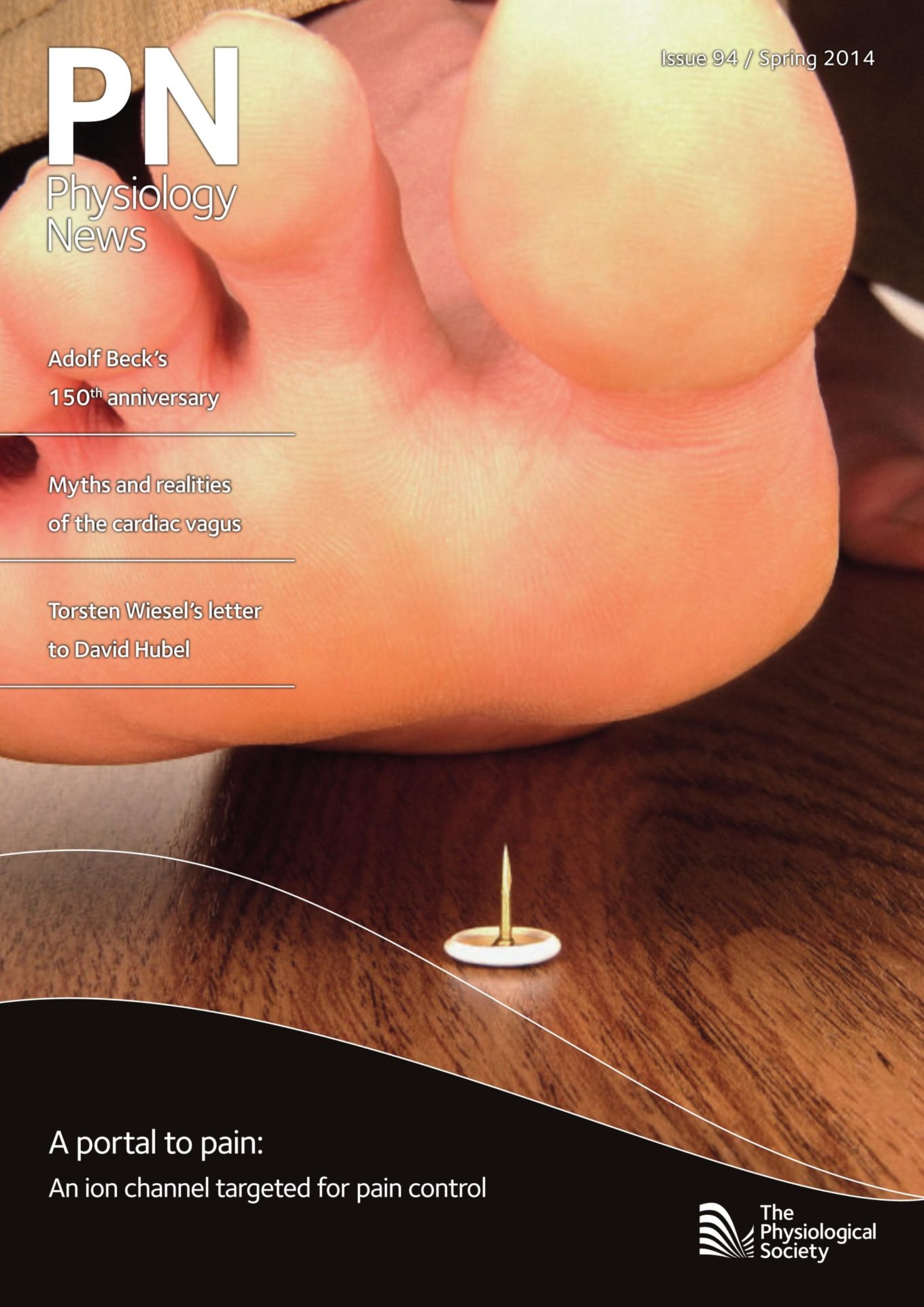
Physiology News Magazine
Keeping the UK a world leader in the field of bioscience
News and Views
Keeping the UK a world leader in the field of bioscience
News and Views
Tracey Jewitt
BBSRC, UK
https://doi.org/10.36866/pn.94.10

Physiology research – from lab to lives
As a society we currently face major global challenges such as feeding nine billion people sustainably by 2050, developing renewable low carbon sources of energy, and increasing health span in line with lifespan.
In the coming decades bioscience will be at the heart of providing solutions and the Biotechnology and Biological Sciences Research Council (BBSRC) has a central role to play in ensuring the UK remains a world leader in the field and is at the forefront of providing sustainable solutions.
In 2012/13, BBSRC invested around £467M in world-class bioscience research and training on behalf of the UK public to further scientific knowledge, to promote economic growth, wealth and job creation, and to improve quality of life in the UK and beyond.
Funding streams
As well as a strong commitment to funding curiosity-led research across a broad base, at the core of our remit BBSRC has three strategic priority areas: agriculture and food security; industrial biotechnology and bioenergy; and bioscience for health.
Animal and plant physiology have an important role to play across these areas – as to find solutions we need a thorough understanding of the normal functioning of living organisms and their component parts.
BBSRC’s main funding mechanism for all research, including animal physiology, is through responsive mode grants – whereby applications can be made to one of four research committees on any topic within BBSRC’s portfolio, throughout the year. Within the responsive mode remit, BBSRC has a set of Council-wide research priorities, including animal health, ageing research, livestock production, welfare of managed animals and the replacement, refinement and reduction (3Rs) in research using animals.
It is important to note that BBSRC funds human physiology research relevant to understanding normal human function, but does not support work on specific human disease, disease process or abnormal conditions – these are areas funded by the Medical Research Council.
BBSRC also has special opportunities: for example, last year £1.4M was awarded to three projects looking specifically at athletes’ vision and movements at a physiological level. These awards were made in collaboration with UK Sport and the Economic and Social Research Council as part of a ‘High Performance Sports’ call. The findings will not only help to improve sporting performance but also provide answers which will benefit our ageing population.
Another way BBSRC has been working with Research Organisations to ensure vital physiology skills are not lost is through Strategic Skills Awards. In partnership with the MRC, BBSRC introduced this scheme to ensure departments do not feel under financial pressure to keep students away from high-cost research training which is strategically important for the UK. Since their inception in 2010, over 35 have been awarded totalling nearly £900k.
BBSRC’s Doctorial Training Partnerships (DTPs) also support physiology researchers. DTPs are BBSRC’s mechanism for awarding universities and institutes funding for PhD students. DTP bids are invited to address strategically important niche skills within the BBSRC remit, including in vivo skills, where partners have the necessary expertise and facilities.
David McAllister, BBSRC Head of Skills and Careers, explains: “Maximising the impact of our science, socially and economically, is dependent on researchers having world-class skills as well as the ability to translate their research ideas and knowledge into technologies and therapeutics to meet the challenges we face. For example, with a growing, ageing population, the need has never been greater to understand the fundamental bioscience underpinning health and ageing.”
Skills gap
In 2004, a British Pharmacological Society/Physiological Society survey documented a significant decline in the number of university departments able to deliver in vivo teaching.
As a result BBSRC in partnership with the Higher Education Funding Council for England, the MRC, the Scottish Funding Council, the British Pharmacological Society’s Integrative Pharmacology Fund and the Department for Business Innovation and Skills awarded £12.3M in ‘Capacity Building Awards’ to support four major projects to build capacity in integrative mammalian biology (IMB).
These four centres, which have come to the end of their awards, were Imperial College London, King’s College London and through two consortia between the universities of Manchester and Liverpool and the Universities of Glasgow and Strathclyde. Over 150 PhD students and 600 undergraduates have benefited from training at the centres.
“Animal physiology is central to the development of new therapeutic approaches to human and animal diseases so BBSRC saw addressing the skills gap in advanced in vivo sciences through springboard funding as vital to the future development of safe and effective therapeutics.
“BBSRC has a crucial role to play in nurturing and developing scientists to ensure they have the skills and facilities to carry out world-class science and we will continue to do all we can to train and support highly skilled researchers in stringent economic times,” says McAllister.
Wider training opportunities are also available to BBSRC funded researchers working in any area, including media and public engagement training as well as awards which support and encourage the movement of people between environments and commercialisation.
To find out more about the research and training opportunities offered by BBSRC, visit: www.bbsrc.ac.uk
Case study: Strategic Skills Award
Charlie Kwok is in her final year of a PhD looking at the neurobiology of pain, specifically looking at the development of endogenous pain signalling pathways during postnatal development at the University of Nottingham.
“I did my undergraduate degree in Neuroscience and one of the core modules was systems neuroscience, which included pain as a main topic. I came across a lot of research papers during my studies and physiological techniques were almost in all of them. At the time I had never performed any experiments like this and I was intrigued. In order to understand the research and interpret the data, I needed to understand the methodology, so I decided I wanted to learn more about physiology.
A BBSRC Doctoral Training Grant and a BBSRC Strategic Skills Award have enabled me to do a PhD in neurobiology of pain, which is what I wanted to do after I graduated. I was fortunate enough to be working in the Laboratory of Developmental Nociception, with very supportive, knowledgeable supervisors and fun lab members. I am now fully trained in a range of techniques, such as electrophysiology, immunohistochemistry and RT-PCR (a molecular biology technique to look at gene expression), and I have performed several studies using these techniques. BBSRC has also given me an opportunity to do a seven week placement at Unilever (research assistant in the ice-cream division), as part of BBSRC’s Doctorial Training Partnership (DTP). Overall, the Strategic Skills Award has been really important to my training and career development.”
Case study: Physiology spin-out
Following a BBSRC-RSE Enterprise Fellowship, Margaret Craig – a researcher in cardiovascular physiology – has added Chief Executive Officer of Clyde Biosciences to her CV, a company she hopes will become a world leader in drug toxicity innovation.
Craig explains: “After graduating from the University of Strathclyde with a degree in Immunology/Pharmacology I went on to complete a PhD at the University of Glasgow in the pathophysiology of cancer. Following this I became a research associate where I was involved in the development of biological assays and novel discovery platforms as well as cardiovascular physiology research.
In 2011 I was awarded a BBSRC/RSE enterprise fellowship which allowed me the time and money to spend one year validating our group’s technologies, exploring the market potential and carrying out business training. During the course of the year, it became apparent that our technology had much commercial potential and we formed the spin-out company Clyde Biosciences.
Before this I never knew anything about business or thought it was something I’d find myself involved in. But I love it and I don’t think I could do anything else now.
For more information about Enterprise Fellowships, visit: www.bbsrc.ac.uk/enterprisefellowships
Case study: Responsive Mode Funding
Roxana Carere from the University of Southampton has recently been awarded £600K of responsive mode funding to study the physiology of perivascular drainage of the brain and how it is affected by age, over the next three years.
Carere explains: “Fluid and soluble waste drain from all organs of the body to regional lymph glands. For organs such as the lung and liver, there are clearly defined channels along which the fluid and waste products drain. However, there are no such well-defined channels to drain fluid and waste products from the brain; instead, the drainage pathways are very narrow and confined to the walls of the arteries that supply the brain. This drainage pathway for waste products from the brain has received little attention in the past but its importance is becoming increasingly recognised because of its potential role in the decline of mental and psychological health. There are many unknown factors concerned with the perivascular drainage pathways from the normal brain and they need to be resolved before measures can be taken to maintain normal mental health in the elderly.”
